by Deep Green Resistance News Service | Jan 23, 2017 | Colonialism & Conquest
Featured image: Without access to their ancestral land, the Baka’s health has deteriorated and they face an uncertain future. © Survival International
by Survival International
An internal report commissioned by the World Wildlife Fund (WWF) into the impact of its conservation work in Cameroon on Baka “Pygmies” has been leaked after WWF denied it existed. It reveals:
—WWF knew that the Baka had not been consulted over the national parks which have taken over their land. However, the organization has since maintained publicly that there was “a high level of … community consent.”
—Some ecoguards patrolling the area “behave like masters and lords” towards the Baka, mounting “crackdowns” that are “terrifying.” Despite this, a WWF spokesman described the ecoguards as “performing their designated function of protecting the forests and securing the access and areas of forest communities, including … the Baka.”
—Many perpetrators of abuses are not disciplined when violations are reported by the communities “despite the communities’ condemnation, with proof.” WWF, however, continues to say publicly, “When unacceptable behavior has come to WWF’s attention… WWF has taken the issue up directly and emphatically with [the government], and improved behavior has seemed to follow.”
—“Most of the local villages are affected [by ecoguard abuse]” – but WWF maintained in a written submission to the OECD that “the possibility of ecoguard abuse does not currently seem to be a high priority for most Baka communities.”
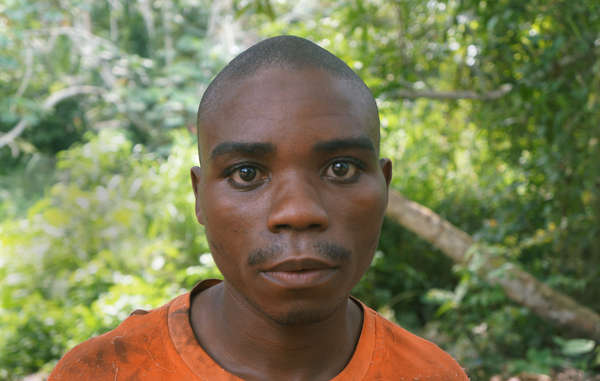
This Baka man was beaten by guards. Survival has spoken to dozens of similar victims across the Congo Basin.
© Survival International
Contrary to its own guidelines, WWF has never released the report, despite requests from Survival International and Baka activists. In an interview with the environmental magazine Mongabay, WWF’s “Head of Issues Management” Phil Dickie denied that WWF had commissioned any investigation into Survival’s allegations.
Survival International lodged a formal complaint in February 2016 with the Swiss National Contact Point of the OECD over WWF’s activities in Cameroon. The complaint was admitted in December 2016, the first time a non-profit organization has been scrutinized in this way.
One Baka man said: “The forest used to be for the Baka but not anymore. We would walk in the forest according to the seasons but now we’re afraid. How can they forbid us from going into the forest? We don’t know how to live otherwise. They beat us, kill us and force us to flee.”
Survival’s Director Stephen Corry said: “WWF commissions a report to look into its effect on the Baka, presumably including claims of abuse committed by the ecoguards it funds. The report confirms the abuse is widespread and routine. WWF then denies the report exists. It’s time for this big conservation organization to square up to the responsibilities it has to those who have seen their land stolen for conservation. And it’s time the world woke up to the horror that’s going on in the name of conservation. It’s not just Cameroon and not just WWF: the conservation industry has a history of taking tribal people’s land. It’s green colonialism and we’re doing all we can to fight it. Many conservationists know that tribal peoples are the best guardians of the natural world which is why the big conservation organizations should start listening to them rather than conspiring in their destruction.”
See here for a comparison of what WWF’s internal report says about Baka abuse with what WWF have said publicly, and what the Baka say. The full report is available on request.
“Pygmy” is an umbrella term commonly used to refer to the hunter-gatherer peoples of the Congo Basin and elsewhere in Central Africa. The word is considered pejorative and avoided by some tribespeople, but used by others as a convenient and easily recognized way of describing themselves.
by Deep Green Resistance News Service | Dec 24, 2016 | Colonialism & Conquest
Featured image: Rosa Andrade was the last female speaker of the Resígaro language. © Alberto Chirif
by Survival International
The last female speaker of the Resígaro language has been murdered in Peru. Her body was found decapitated at her home in the Amazon rainforest.
Rosa Andrade, 67, lived with the Ocaina tribe. Her father was Ocaina and her mother Resígaro.
The Ocaina and Resígaro tribes were victims of the rubber boom, which began at the end of the nineteenth century. Tens of thousands of Indians were enslaved by rubber barons intent on extracting rubber in the Amazon. Many indigenous people died from sheer exhaustion, or were killed by violence and diseases like flu and measles to which they had no immunity.
The Resígaro tribe was eventually wiped out, and Rosa and her brother became the last remaining speakers of the language.
Rosa was also one of the last speakers of Ocaina and was regarded as a pillar of her community. She knew a wide repertoire of songs and stories in both languages and had recently been designated, by the government, to teach children Ocaina
Five thousand of the world’s six thousand languages are indigenous, and it is estimated that an indigenous language dies once every two weeks.
There are over a hundred uncontacted tribes worldwide, and their languages are the most endangered. Survival International is campaigning for the lands of uncontacted tribes to be protected, for where their rights are respected, they continue to thrive.
Rosa’s community suspects that an outsider, known for violent behavior, is responsible for the murder. However, the local prosecutor has declared that there is insufficient evidence to prosecute. The community is calling for a serious investigation to take place to find the culprit.
by Deep Green Resistance News Service | Dec 18, 2016 | Colonialism & Conquest
Featured image: The Congo Basin tribes have lived sustainably in the forests of central Africa for generations.
© Selcen Kucukustel/Atlas
by Survival International
In an unprecedented protest, 19 “Pygmy” communities in central Africa have denounced conservation projects on their land. Eleven of the communities have urged conservationists to stop funding the anti-poaching squads who have abused them.
The Worldwide Fund for Nature (WWF) and the Wildlife Conservation Society (WCS) – two of the world’s biggest conservation organizations – have helped to create protected areas in the region from which tribal peoples have been illegally evicted.
The Baka and Bayaka “Pygmies” and their neighbors have endured years of violence, intimidation and abuse as a result of these conservation projects in Cameroon, the Congo, and the Central African Republic. But the organizations behind them, including WWF and WCS, have failed to change their approach, and continue to fund the squads.
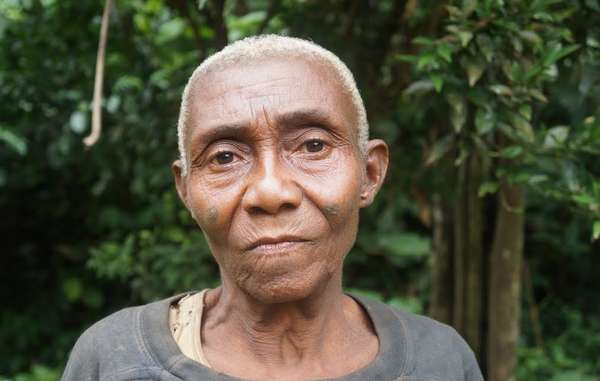
Ndoye, a Baka woman from Cameroon. Five people are reported to have died in her community alone at the hands of WWF-funded wildlife guards.
© Survival
In one letter Baka said: ”How are we going to survive in this world? We say to those who are giving money to [the conservationists]: ‘Do you want them to kill us?’ We no longer live well.”
Bayaka from the village of Socambo, said: “Despite the money that you provide to conserve the forest, we don’t benefit at all. Our ancestors lived perfectly well in this forest… Please think of us poor indigenous people who use our forest. We are fed up with how the project has cut us off from the forest.”
Bayaka from Mossapoula said: “We … are suffering a lot because of conservation. The guards threaten us, beat us, steal from us, even outside the park. And yet we have the right to enter the park. We ask you to come to Mossapoula before continuing your funding in order to hear our problems and seek our consent.”

Saki, a Bayaka woman whose husband was found murdered in the forest. From evidence at the scene, the family is convinced that he was killed by wildlife guards.
© Survival
The Bakwele chief of Ndongo said: “WWF has been coming here since 1996. We used to be very happy. But now we find ourselves marginalized and tormented in every way… We here are now only living on rice, really. Sir, your agents are very, very aggressive and we don’t want them to come here any more.
“In short, to those funders: if you have any projects, come to the field yourselves. I repeat: your agents are not here for work but for corruption. The guards have become the real poachers. They no longer respect the park limits. We no longer have access to the park.”
“Pygmies” face harassment and beatings, torture and even death while big game trophy-hunting tourists are encouraged. Tribal peoples are illegally evicted from large parts of their ancestral land and forced to live on roadsides where poverty and disease are rife. They have faced violence and plummeting health standards in the name of conservation – while WWF and WCS partner with logging companies like Rougier, CIB and SINFOCAM.
Survival’s Director Stephen Corry said: “As these powerful statements from “Pygmies” show, conservation projects are proving deadly for tribal peoples in the Congo Basin. As they see it, WWF and WCS have taken their land, ignored their rights, and continue to fund those abusing them. WWF and WCS have turned natural allies of conservation into its victims. The big conservation organisations really must start listening to these tribal peoples.”

Cameroonian wildlife guard Mpaé Désiré, who in 2015 was accused of beating Baka and in 2016 was arrested for involvement in the illegal wildlife trade.
© Facebook
Background briefing
– WWF has been active in the Congo Basin for decades. Survival first raised concerns over its proposed projects in 1991.
– The region is home to dense rainforests and several iconic species, including the giant pangolin, lowland gorilla and forest elephant. Tribal peoples like the Baka and Bayaka have been dependent on and managed this environment for generations.
– According to European Union reports, no logging activity in Cameroon is being carried out lawfully. Despite this, WWF has entered into partnerships with several companies who are active in the region.
– WWF cites the need to protect wildlife from poachers as the justification for funding, training and equipping wildlife guards. However, several of these guards have themselves been involved in the illegal wildlife trade. Earlier this year, for example, one guard, Mpaé Desiré was arrested for involvement in the illegal wildlife trade.
– A Baka man told Survival: “Guards used to open tins of sardines and leave them as bait to attract leopards, so they could hunt them for their skins.” Rainforest tribes have unparalleled knowledge of their environment, but WWF has instead put its faith in armed guards and corrupt officials.
Tribal peoples have been dependent on and managed their environments for millennia. Their lands are not wilderness. Evidence proves that tribal peoples are better at looking after their environment than anyone else. They are the best conservationists and guardians of the natural world. They should be at the forefront of the environmental movement.
But tribal peoples are being illegally evicted from their ancestral homelands in the name of conservation. The big conservation organizations are guilty of supporting this. They never speak out against evictions.
The big conservation organizations are partnering with industry and tourism and destroying the environment’s best allies.
Watch: Baka describe beatings and abuse at hands of anti-poaching squads.
“Pygmy” is an umbrella term commonly used to refer to the hunter-gatherer peoples of the Congo Basin and elsewhere in Central Africa. The word is considered pejorative and avoided by some tribespeople, but used by others as a convenient and easily recognized way of describing themselves
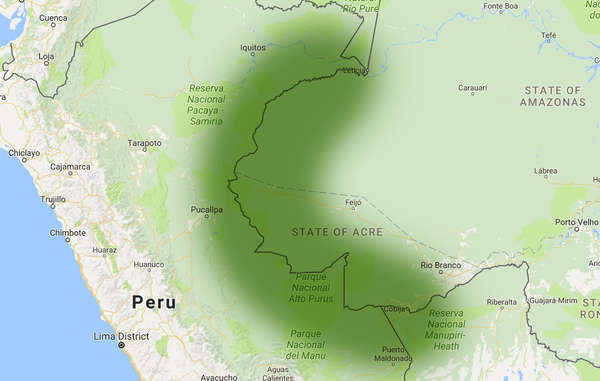
by Deep Green Resistance News Service | Dec 1, 2016 | Colonialism & Conquest
Featured image: The Amazon Uncontacted Frontier, a large area on the Peru-Brazil border that is home to the largest concentration of uncontacted tribes in the world. © Survival International
By Survival International
A new “death road” advocated by a notorious Italian priest is set to cut in two the land of several uncontacted tribes in the heartland of the Amazon Uncontacted Frontier.
The road is expected to be approved by Peru’s congress soon, and will run through 270 km of the Amazon’s most biodiverse and sensitive protected areas.
The project has been supported for years by Father Miguel Piovesan, a Catholic priest who has described the local tribal peoples as “prehistoric,” and slammed international NGOs for raising concerns about the plan.
The road was rejected by Peru’s Congress in 2012. Despite this, work continued illegally for many years, and now the project has been proposed again by Congressman Carlos Tubino.
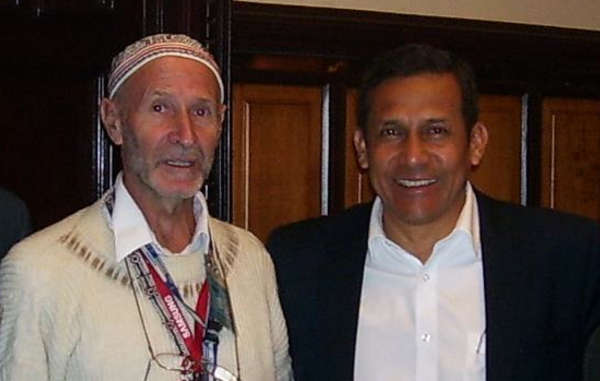
Fr. Miguel Piovesan, the main backer of the Purus road, alongside former President Ollanta Humala.
© Anon
Uncontacted tribes are the most vulnerable peoples on the planet. There are estimated to be around 15 uncontacted peoples in Peru, many of them in the region where the road will be built.
Survival International has lodged a complaint with the United Nations, citing the catastrophic impact on the uncontacted Indians and urging the Peruvian government to veto the plan.
Of the 3-4,000 people in the area, around 80% are indigenous. Most of them are opposed to the road.
Emilio Montes, president of the indigenous organization FECONAPU, which is based in Puerto Esperanza said: “We flatly reject this road. We indigenous people won’t benefit from it, only the loggers, miners, oil companies and narcotraffickers. It threatens the lives of our isolated relatives, like the Mashco Piro. It will destroy our animals and plants. They should, instead, respect our ancestral territories. We’ve always lived here, and our children must carry on doing so. We need another type of development which looks after our resources sustainably: so that we can live properly, and secure our future.”
Survival’s Director Stephen Corry said: “If this road goes ahead, it will destroy the uncontacted tribes, and their “development” will be terminated for ever. Survival has fought roads in this part of Amazonia for decades. Who are they supposed to help? If Peru has any respect for fundamental human rights and the rule of law, it must stop these plans now.”
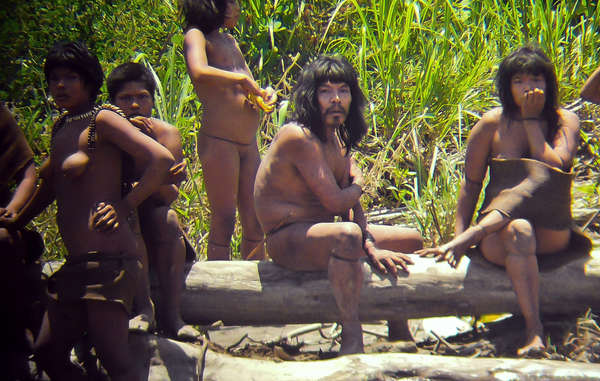
Uncontacted Mashco-Piro Indians on a riverbank near the Manú National Park. 2011.
© Jean-Paul Van Belle
Background
- The road will connect Puerto Esperanza to the Inter-Oceanic Highway, which runs through Peru and Brazil. The area is part of the Amazon Uncontacted Frontier, the region along the Peru-Brazil border with the highest concentration of uncontacted tribes in the world.
- Uncontacted peoples who could be wiped out if the road is built include the Mashco Piro, Chitonahua, Mastanahua and Sapanawa, who have all lived nomadically in the region for generations. Outsiders such as missionaries and loggers have forced several groups to make contact in recent years.
- Elsewhere in the Amazon, road “development” projects have allowed an influx of colonists to access remote areas and threaten the lives and lands of uncontacted peoples.
- Several indigenous organizations in Peru have made a statement rejecting the road.
- Fr. Piovesan has repeatedly denied the existence of uncontacted peoples. His parish newsletter stated that: “Isolation is not a natural wish. We can’t prove that isolated people exist. They are dreamt up by those who barely know indigenous people, or base their investigations on unproven theories.”
- Uncontacted Indians have clearly expressed their desire to remain uncontacted. The project cannot be carried out with their consent and will violate their right to determine their own futures.
We know very little about uncontacted tribes. But we do know there are more than a hundred around the world. And we know whole populations are being wiped out by genocidal violence from outsiders who steal their land and resources, and by diseases like flu and measles to which they have no resistance.
Uncontacted tribes are not backward and primitive relics of a remote past. They are our contemporaries and a vitally important part of humankind’s diversity. Where their rights are respected, they continue to thrive.
All uncontacted tribal peoples face catastrophe unless their land is protected. Survival International are doing everything we can to secure their land for them, and to give them the chance to determine their own futures.
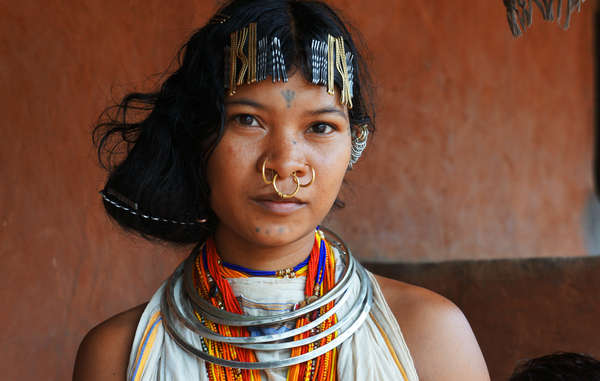
by Deep Green Resistance News Service | Nov 25, 2016 | Indigenous Autonomy, Mining & Drilling
by Survival International
A mining company in India has renewed its efforts to start mining on the sacred hills of the Dongria Kondh people, despite previous defeat in the Supreme Court, and determined opposition by the tribe.
The Dongria Kondh consider the Niyamgiri Hills to be sacred and have been dependent on and managed them for millennia. Despite this the Odisha Mining Corporation (OMC), which previously partnered with British-owned Vedanta Resources, is once again attempting to open a bauxite mine there.
In February this year, OMC sought permission from India’s Supreme court to re-run a ground breaking referendum, in which the Dongria tribe had resolutely rejected large-scale mining in their hills. This petition was thrown out by the Supreme Court in May.
India’s Business Standard reported recently that OMC is gearing up for yet another attempt to mine, after getting the go-ahead from the government of Odisha state.
Dongria leader Lodu Sikaka has said: ”We would rather sacrifice our lives for Mother Earth, we shall not let her down. Let the government, businessmen, and the company argue and repress us as much as they can, we are not going to leave Niyamgiri, our Mother Earth. Niyamgiri, Niyam Raja, is our god, our Mother Earth. We are her children.”
For tribal peoples like the Dongria, land is life. It fulfills all their material and spiritual needs. Land provides food, housing and clothing. It’s also the foundation of tribal peoples’ identity and sense of belonging.
The theft of tribal land destroys self-sufficient peoples and their diverse ways of life. It causes disease, destitution and suicide.
The Dongria’s rejection of mining at 12 village meetings in 2013, led the Indian government to refuse the necessary clearances to mining giant Vedanta Resources. This was viewed as a heroic David and Goliath victory over London-listed Vedanta and the state-run OMC.
Only the Dongria’s courageous defence of their sacred hills has stopped a mine which would have devastated the area: more evidence that tribal peoples are better at looking after their environment than anyone else. They are the best conservationists and guardians of the natural world. Protecting their territory is an effective barrier against deforestation and other forms of environmental degradation.








